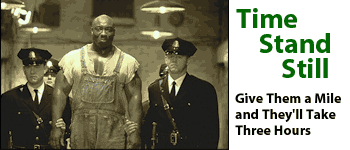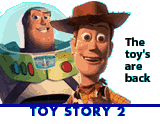
| ||||||
|
| ||||||
| DECEMBER 1999 | FEATURES ALSO THIS MONTH LAST MONTH
| 
TIM CLIFTON Unfortunately, despite credible performances and great period detail, length kills "The Green Mile." Sometimes three hours (or more) are required to tell the epic scope and sweep of a story that may span generations ("The Godfather Part II") or profile a complex character ("Lawrence of Arabia"), the banality of evil ("Schindler's List"), chronicle the west in the 1800's ("Dances with Wolves") or a colossal tragedy ("Titanic"). The point is that sometimes it takes that long to tell a story and that is all well and fine if the story has the chops to do it. Tom Hanks ("Saving Private Ryan", "You've Got Mail") plays Paul Edgecomb, head of a Louisiana prison guard detail for death row inmates in 1935. The newest addition to death row is John Coffey (note the religious significance of his initials), played effectively by Michael Clarke Duncan. He's been convicted of raping and murdering two young white girls. But it soon becomes apparent that Coffey has special powers and is not your typical inmate. A healer on Death Row. The mind reels at the implications and the morality lesson that will be visited upon the audience. "Green Mile" uses its length to make statements about everything from racism to the power of the human soul; and from, what is apparently, an anti-death penalty stance to being touched by an angel. Individuals are symbols in this drama and telegraph their motivations and meanings with the subtlety of a leaf blower. Coffey, an enormous man, has a heart of gold who wants to sleep with a night light. Another prisoner is touched by the appearance of a mouse. Little quirky touches that are supposed to magnify characters but just come across as, well, quirky. But quirks don't, in and of themselves, give dimension to characters. Anti-death penalty message and graphic execution scenes--yes, we get to watch three executions--after all, it's a holiday movie. The racist guard. Gotta have it, no preachy polemic is complete without it. And as played by Doug Hutchison he's evil through and through, an unregenerate bastard of a racist. Make no mistake, these are all important issues, but when they are represented in such a cardboard style that reduces the seriousness of the story, they unintentionally trivialize the impact. I think of a film such as "The Music Box" in which a daughter staunchly defends her father against charges of war crimes, but when she discovers uncontrovertible evidence that he killed innocent people, the dilemma posed is real and troubling. Often the banality of evil is what is most surprising and terrifying, which is effectively shown in "Schindler's List". The S.S. are not, at least on the surface, ugly men. They have families, they raise their children, and they have career goals, standing in the society and perhaps self loathing; yet they still committed unspeakable crimes. That is effective storytelling: highlighting the contradictions and the conflicts. That's the source of a riveting film. Statements slammed home with a sledgehammer just aren't effective. Stephen King has had several of his contemporary "straight" fiction works adapted to the screen including "Stand By Me," "The Shawshank Redemption" and "Apt Pupil." Of these, "Shawshank" is strongest: a movie mangled in its marketing that showed incredible legs once it went to video. Frank Darabont directed that film, and also wrote and directed "Green Mile" but the results here are diluted. I haven't seen length work against a film this badly since "Eyes Wide Shut." But here, the length is a matter of a story that wanders around its central themes and mistakes repetition for impact. Part of the structural problem in this movie can be traced to the source material. The novel "The Green Mile" is evocative fiction and what distinguishes it from other King novels is how it was conceived and delivered to the market. The book was originally released as a serialized novel (chapbooks as King refers to them), in six segments, and King worked under true deadline pressure, performing the equivalent of a high wire writing act to produce on time to meet publication. Thus, there is an episodic quality to "The Green Mile" where story threads appear, disappear, and then reappear. In staying true to the source, the film often lacks focus and at the same time reiterates things over and over unnecessarily, such as Hanks' bladder infection. How many times do we have to watch him urinate in pain? I know a movie isn't holding my attention when I keep checking the time on my Indiglo watch, thinking about the 75 degree Southern California day I'm missing outside, wondering what is making my shoes stick to the floor. Then I'm comparing Tom Hanks' accent in this movie to "Forrest Gump" except here he has a bladder infection and is apparently smart enough to hold down a day job. At that point I knew the movie had lost me. Certainly, in a time when many movies are ugly and irredeemable, "Green Mile" is an alternative for people who are Tom Hanks fans and want to see a story with a positive message. It has some power in individual scenes and boasts a strong supporting cast. "Green Mile" is not a bad movie, but it needs the celluloid equivalent of Slim Fast, both in terms of length and its sanctimoniousness. TIM CLIFTON is Renaissance Online Magazine's staff movie reviewer. | |||||
 | ||||||
| Full Issue Contents | FEEDBACK | Questionnaire | Archive | Free Subscription | ||||||



